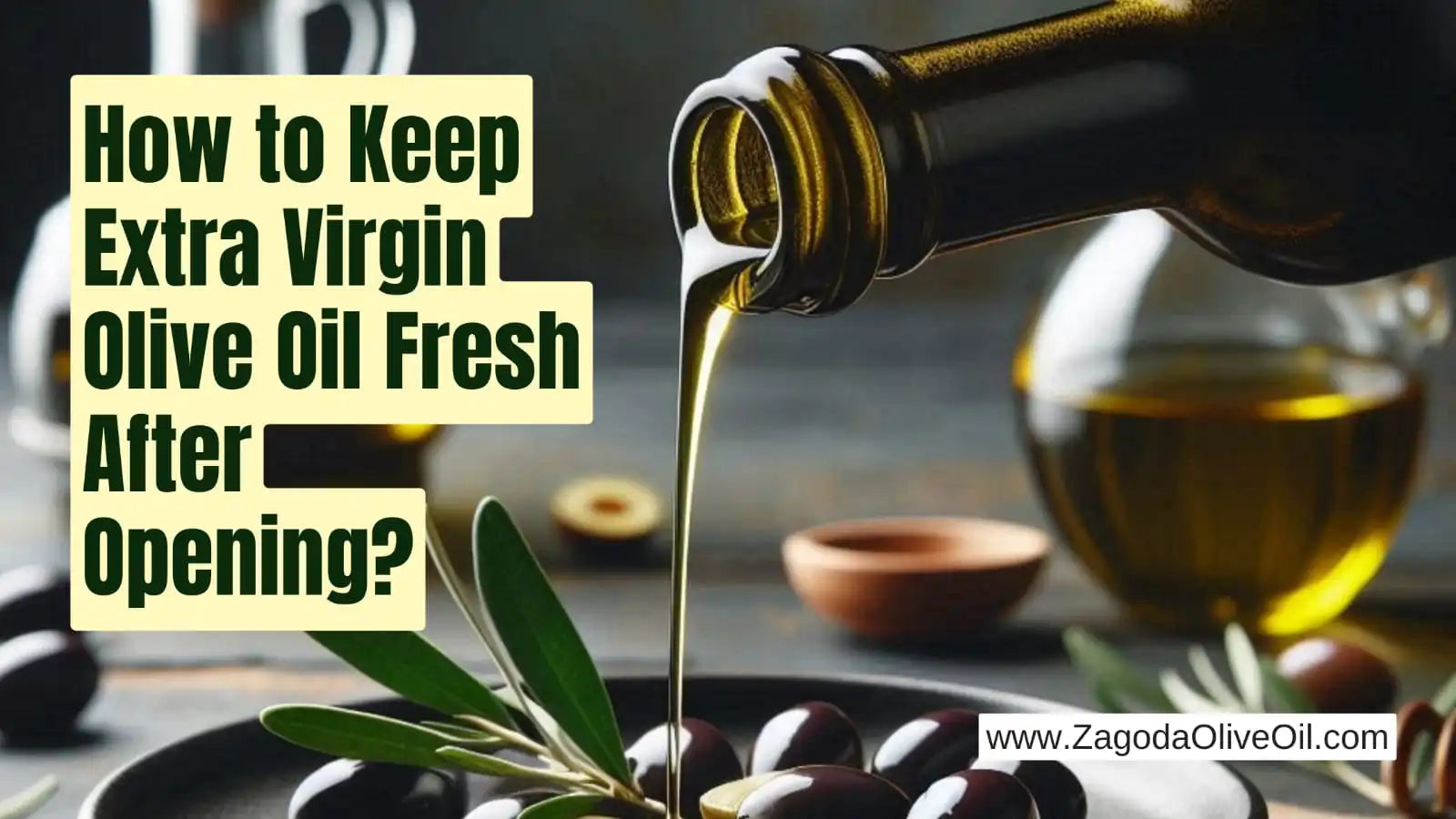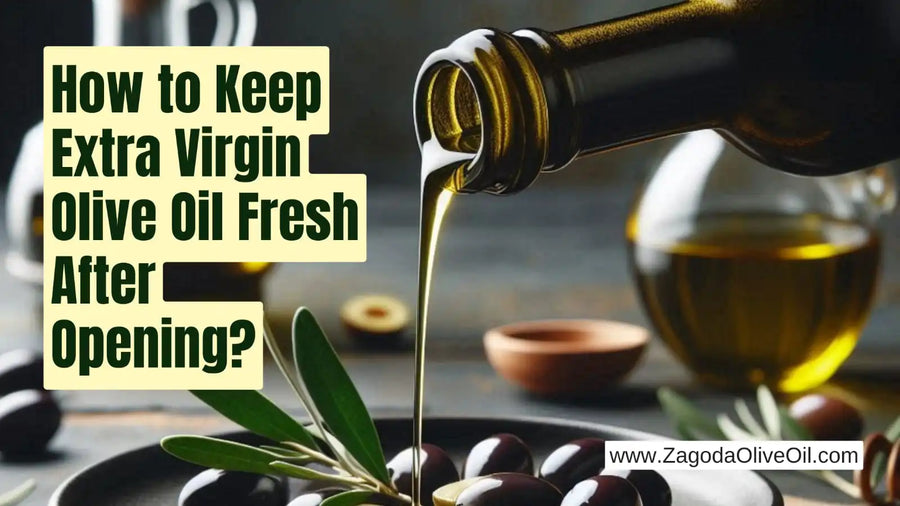There is debate about whether or not refrigerated extra virgin olive oil keeps its quality when it is opened. Loved for its strong taste and health benefits extra virgin olive oil can lose its quality over time since it is light, heat, and air sensitive.
To keep it fresh and make sure that every drop maintains its flavor and nutritional value, it is essential to understand the optimum storage procedures. Let's look at the aspects that impact this decision and how to preserve your olive oil at its finest.
What to do instead?
Because olive oil is a sensitive component, refrigerating it can cause it to harden, fog, and lose its flavor and perfume. Store it in a cool, dark place, away from light, heat, and air, like a pantry or cupboard, if you want to maintain its quality and freshness. Storage should be done at a temperature between 57 and 70°F.
It's also vital to remember that exposure to air can oxidize and degrade the product. To keep air out, make sure the container is properly shut. It's a typical ingredient for cooking, marinating meats, and dressing salads. It's a mainstay in many cuisines and has several health benefits.
Furthermore, to use premium oil in the kitchen, it's vital to keep it properly to preserve its freshness and quality. By reading this article, you will better know about whether extra virgin olive oil should be refrigerated after opening.
Make use of it
Good-grade extra virgin olive oil is often saved for special occasions, but it should always be consumed when it's still fresh! Extra virgin olive oil should be bought between 12 to 18 months of harvest and should be consumed within six months of opening, as olive oil has a shelf life of 18 to 24 months once it is bottled. After opening, we advise using the oil within 30 to 60 days.
Remember that fresh extra virgin olive oil has the greatest flavor and health benefits. By reading this article, you will better know about whether extra virgin olive oil should be refrigerated after opening.
Keep the light off of it.
The amount and type of antioxidants in olive oil can degrade after prolonged exposure to light. To reduce light exposure, olive oil should be stored in dark glass or tin. Furthermore, keep it out of direct sunlight as light exposure significantly reduces the shelf life of extra virgin olive oil.
Keep it in proper storage.
Extra virgin olive oil should be kept out of the heat, light, and air. These substances quicken the oxidation process that causes rancidity. As oxidation happens organically over time, it is recommended to finish the oil within the first six months of opening.
Because it is exposed to constant heat, olive oil shouldn't be kept next to the stove.
Additionally, it is not advised to keep oil refrigerated since condensation inside the bottle might produce odd flavors. Keep your oil in a cupboard or cabinet that is cold and dark. By reading this article, you will better know about whether extra virgin olive oil should be refrigerated after opening.
Olive oil should be stored between 60 and 72 degrees Fahrenheit. The olive oil develops undesirable flavors when it is exposed to warmer temperatures. By reading this article, you will better know about whether extra virgin olive oil should be refrigerated after opening.
Does Olive Oil Go Bad?
If you're organizing your pantry, you might be concerned about those elegant olive oil bottles arranged in the corner. You might be wondering if olive oil goes bad over time or if it's something you can keep around forever. Olive oil does, in reality, run out even though it lasts a long time.
Explore the Olive oil's shelf life
The olive is considered as a fruit in botany. As fruits have an expiration date, so does olive oil. There comes a time when it loses its flavor and becomes rancid. The majority of olive oils stay fresh in their bottles for 18 to 24 months.
Extra virgin olive oils are less processed and typically expire after 12 to 18 months in bottles. After these periods, olive oils may start to taste bitter or caustic, which could interfere with your cooking in unexpected ways.
A bottling or best-by date is listed on some olive oil bottles. It could be a good idea to mark the date of purchase on your bottles if you don't notice these. You can get a rough idea of how long it has been in your pantry by doing this.
By reading this article, you will better know about whether extra virgin olive oil should be refrigerated after opening.
How to detect rancidity in olive oil?
You may find out whether your olive oil is bad in a few different ways.
Take a tiny taste
You can taste your olive oil to see if it has gone rancid. You won't become ill just a tiny taste, so don't worry. Your olive oil is bad if it tastes sour, harsh, or stale.
Take a smell at it
Instead of vibrant, flavorful olives, bad olive oil may smell odd, like crayons, putty, or Elmer's glue. This is one more indication that it's expired.
Resulting from eating rotten olive oil
Olive oil that has gone rancid won't harm you. But, it could throw off your recipe by adding an odd flavor to the food. Furthermore, olive oil's numerous health advantages are frequently promoted. Some of the powerful antioxidant qualities of rancid olive oil will be lost.
This occurs as a result of oxidation a process in which molecules containing oxygen start a series of chemical events that degrade the antioxidants in the oil.
Even while rancid olive oil usually won't provide the same nutritional benefit it won't harm you. Still, eating fresh olive oil is the best way to get the most antioxidants from it. By reading this article, you will better know about whether extra virgin olive oil should be refrigerated after opening.
The Extra Virgin Olive Oil Fridge Test is a myth
The "Fridge Test," a purportedly easy at-home method to determine the genuineness of olive oil, is a hoax about olive oil that is widely spread. Because of how pervasive the misconception is you can even come across contradictory interpretations of the test.
Some claim that if your oil is genuine it should harden while others say the opposite. Would that it were that simple! Unfortunately, this "test" is completely false and deceptive. See why even the rumor-mongers are perplexed by this one by reading on.
Because the composition of olive oils is influenced by so many natural elements that differ depending on the region, season, and variety of olive, extra virgin olive oil in particular has an extraordinarily complex profile. By reading this article, you will better know about whether extra virgin olive oil should be refrigerated after opening.
Such them are:
- The type of olive
- The conditions for seasonal growth
- The place of origin's latitude
- When to harvest something and how to process it
Conclusion
In conclusion, personal tastes and storage conditions play a major role in determining whether to refrigerate extra virgin olive oil after opening. Refrigeration may help keep the oil fresher longer and increase its shelf life, but it can also cause the oil to harden and become less usable. If the oil is used regularly, its quality may be preserved by keeping it in a dark, cool place.
The choice to refrigerate extra virgin olive oil should ultimately be made by taking into account how rapidly it is used up as well as the particular storage climate, striking a balance between ease of use and preservation requirements.


